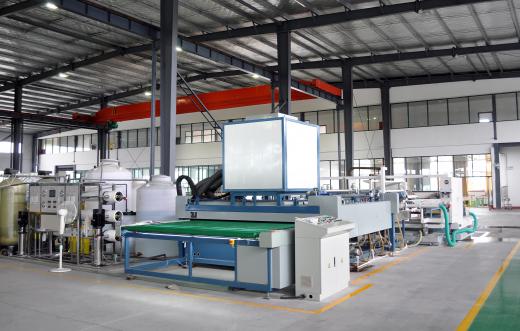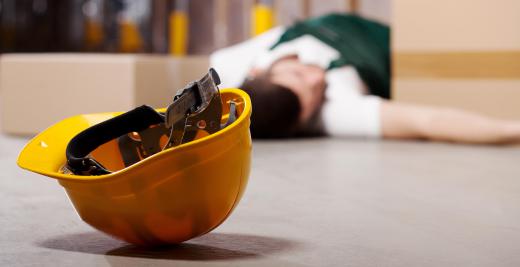An industrial floor mat has many hefty responsibilities. It eases fatigue in employee's legs and feet, protects the underlying concrete floor from spills and dirt, absorbs harmful chemicals and oil, and prevents slips. Manufacturing plants might use an industrial floor mat at entrances, beneath worker stations, along high-traffic hallways, or install wall-to-wall flooring to cover the entire space.
An industrial floor mat is usually made from rubber or vinyl PVC, but possibly includes other layers of carpeting or cushioning. There are many varieties that depend on the specifics of the industry, so that a floor mat for a welder's space would be very different from one for a high-volume storeroom. Specialty mats are designed for practically every atmosphere to increase worker productivity, protect people from health risks, and provide a low-maintenance and durable floor covering.

For example, one kind of industrial floor mat is especially comfortable to walk and stand on. It has been fitted with cushions called "anti-fatigue" components that absorb the impact that would be transferred to ankle and knee joints. Other kinds are electrostatic dissipative, which means that they resist a build up of static electricity that we all know occurs with ordinary carpet. Certain materials are best at absorbing noise and vibrations from large, loud machines. This kind of industrial floor mat will prevent employees from needing to wear headphones or earplugs as a result of loud machinery sounds echoing off of concrete.

Of course, whatever your selected industrial floor mat, it is likely a wise decision because it will increase the lifetime of the flooring underneath it. The mat's frictional backing means it sticks and molds to uneven surfaces without permanently adhering. The top surface is usually textured for high traction, like a "coin" or "rib" design, which means that debris falls into depressions and doesn't pose a slippery hazard. Yet it is also nonporous, so that oil, grease, or corrosive chemicals do not penetrate to the concrete.
A special industrial floor mat has been designed for colder buildings with little insulation. It has built in heater coils that warm feet and surrounding air in frigid conditions. For a welding business, another type of industrial floor mat is fire retardant without using asbestos, so any falling sparks will not melt or burn the floor. Some businesses prefer to put an industrial floor mat at the entrance to their building so it catches salt minerals, sand, and other dirt to keep it out of a work area.
